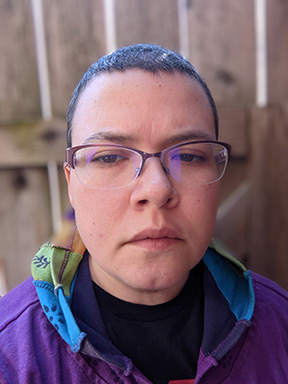Karen Sarita Ingram is half Kentuckian, half German, and proudly 100% Army Brat. Her first published story, “The Suicide Artist,” was featured in Touchstone Literary Magazine’s Spring 2012 issue and won the Best Undergraduate Writing Award at Kansas State University’s English Department the same year. When she’s not demanding to speak to your manager, Karen enjoys science fiction and video games. Against her better judgment, she currently resides in Topeka, Kansas.
---- Interview by Nicole Pyles
WOW: First of all, congratulations on winning runner-up! What inspired you to write this story?
Karen: I began writing flash fiction in an attempt to break my writer's block. I would go to free photo websites, like Unsplash or Pexels, find a random picture, and write a story about it. I managed to write about 100 or so before my writer's block came back. IED started out as Untitled #30, inspired by a photo by Kevar Whilby, which you can see here.
If the photo is not what you expected, great. I'll get to that in Question #5.
The photo reminded me of those perfect moments in life, where you try hard to memorize every detail. I tried to imagine the relationship between the woman in the photo and the narrator, and why they would need a good moment like that to hang on to. That's when I knew the narrator was a soldier.
WOW: I love that photos inspire you because I'm the same way! How do your experiences as an army brat influence your writing?
Karen: I don't usually write about Army Brat life, or about soldiers, but IED definitely pushed me in that direction. I used to hang out with my dad at a local brewery, and he would inevitably end up sitting at a table with a bunch of old veterans, swapping war stories. I never ask a soldier questions about war, but when they feel compelled to speak about it, I listen. It's the least I can do for them. I've heard a lot of very dark stories, but I don't share them. I want to make that clear. IED is not based on a true story, but the smells are.
I think the old cliché that your life flashes before your eyes when you die is probably not accurate, based on most of the stories I've heard from people who have had near-death experiences, but it's a nice idea. A hopeful idea. So I painted a perfect moment for my narrator to hold on to and let it carry them through the horrific experience that was really happening to them.
WOW: You definitely captured that final moment of a wonderful memory carrying someone through a terrible moment (even if it is a cliche!). What is your rewriting and revising technique after you've written the first draft?
Karen: I tend to finish rough drafts quickly in a spurt of inspiration, then just sit on them for a long time. If the idea is any good, I know it will keep pestering me until I return to revise it. Untitled #30 was like that. The rough draft sat around for about two years before I ever looked at it again. But during those two years, it kept lurking in the corner of my mind, muttering. When I saw the Spring 2021 WOW! Contest was an open prompt, Untitled #30 insisted "NOW IS THE TIME." So, I had another look at it... and I hated it. I ended up rewriting the entire thing from scratch. But that seemed to satisfy whatever muse or beast haunts my imaginings, because it finally shut up when I hit "submit."
WOW: How amazing you rewrote it from scratch! What surrounds you when you write?
Karen: Coffee.
WOW: Ha, me too! What do you hope readers take away from reading your story?
Karen: If you ask ten people what a painting or a song means, you get ten different answers. Writing is a form of art, so it's just as open to interpretation as any other art form. I think writers tend to forget that sometimes. It's bewildering to me when an author I like gets irritated because somebody saw sadness in the blue curtains and they're all, "That's not what it means!" I decided a long time ago that I'd have zero expectations about what readers take away from my stories. That's why I was intentionally vague about the narrator's gender and race in IED. I know what I had in mind, and I left a breadcrumb or two to give them a clue, but I'm totally cool if the reader ignores that and cuts their own path through the woods. I know they enjoyed themselves if they tell me where story took them.
WOW: Writing is absolutely an art and you captured it wonderfully! Thank you so much for your time and I can't wait to see what you come up with next.


Nicole--Thanks for doing this interview and for giving us a link to Karen's story.
ReplyDeleteKaren--Congratulations. Letting things sit is almost always a good idea.
I loved the photo that inspired you (I could see exactly how the two connected) and I enjoyed reading your story. It rang true enough, it could have passed for nonfiction.
Good luck with your future writing, Karen.